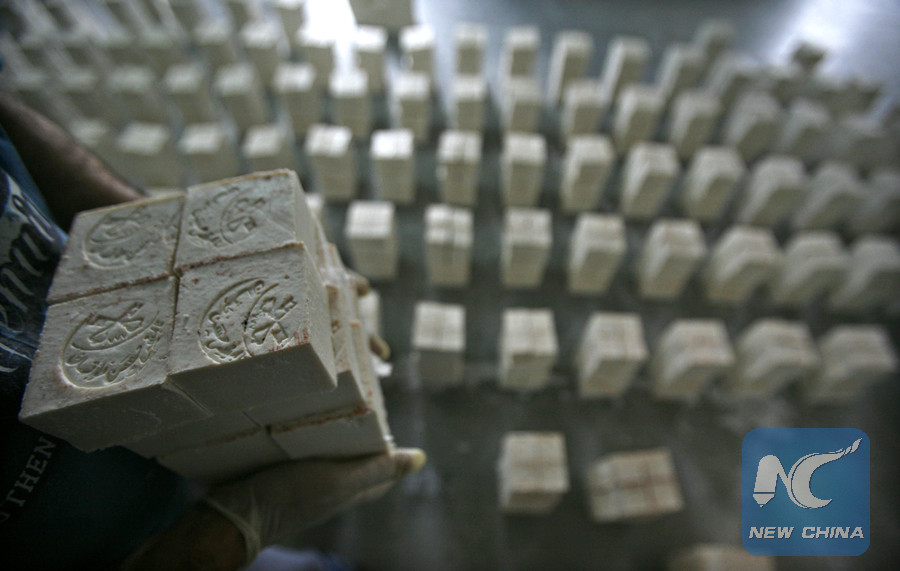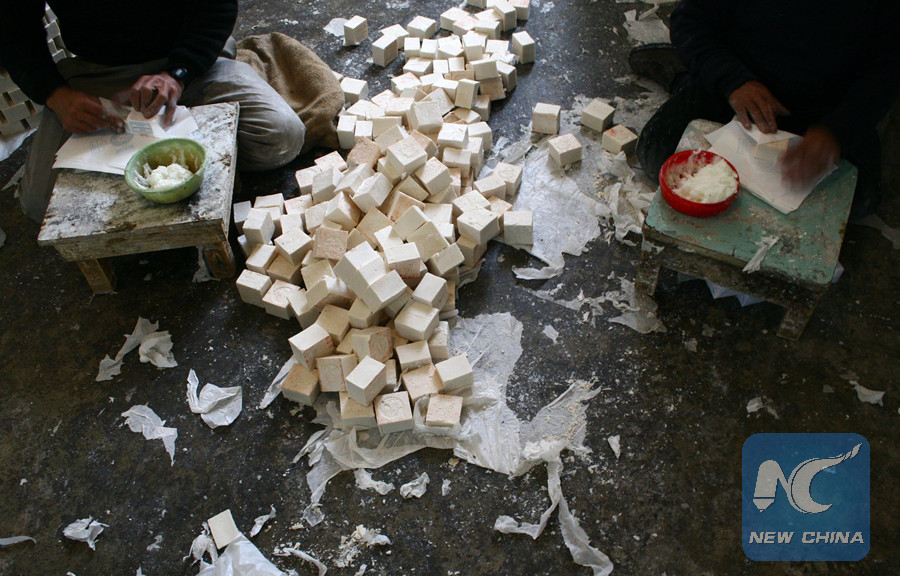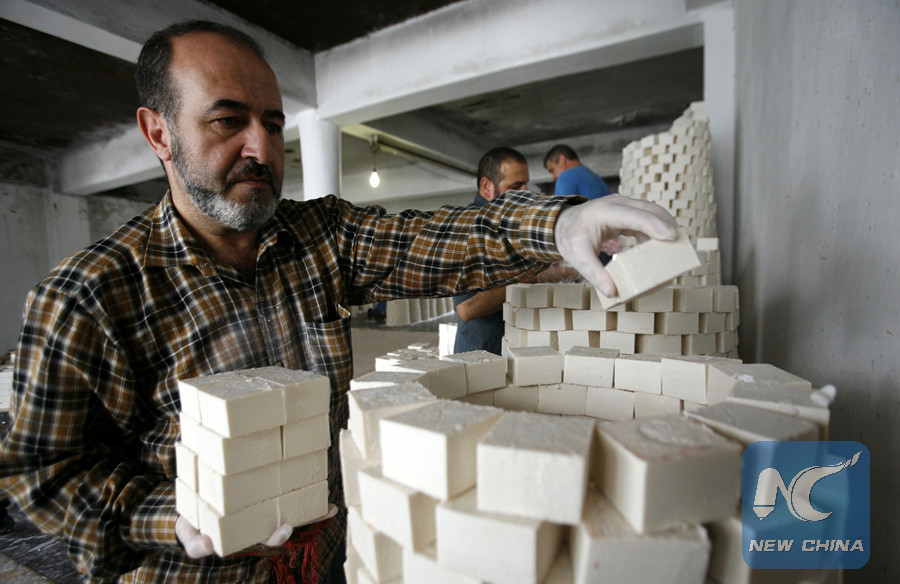
(File photo)A Palestinian worker holds soap pieces at the Touqan factory in the West Bank city of Nablus, on Oct. 8, 2012. The Touqan factory is one of the oldest manual factories in Nablus that manufactures the natural "Nabulsi Soap" since 1894. (Xinhua/Ayman Nobani)
GAZA, Feb. 24 (Xinhua) -- The traditional soap making factories that once flourished in West Bank's Nablus over a hundred years ago are now fighting for surviving against vanishing.
In 1980, the handcraft of soap making was active with 40 factories, but now in 2018, only two are operational.
Owner of an ancient soap factory in Nablus Maher Shak'aa told Xinhua he refuses to change his profession, which he inherited from his grandparents over 120 years ago.
Shak'aa uses his traditional tools to produce the soap, in spite of the retract in this profession due to the usage of modern tools and chemicals in production to replace organic olive oil.
He explained that this profession "is no longer feasible as a business, but we maintain it because of its history and heritage that was passed down to us from our grandparents, and we won't change the original way it is made."
Shak'aa and his team still use every component in the historic way of soap production, except for the gasoline that is replaced with diesel due to its scarcity.

(File photo)A Palestinian worker wraps soap pieces at a traditional soap factory in the West Bank city of Nablus, on Jan 23, 2010. Soap making is one of the oldest industry in Nablus city. The components from olive oil, water and nature sodium obtained from local groves make the soap rich of its unique smell, a sign of the quality and purity of its ingredients. (Xinhua/Ayman Nobani)
Soap making professionals say that the main reason behind the retraction of the business is the Israeli imposed closures and movement restrictions in the West Bank, besides the Palestinain Authority (PA) adoption of free trade that allowed foreign products to compete with local products in the market, and the high cost of olive oil.
Local hand made soap is relatively expensive compared to imported soap, reaching a cost of 1.5 U.S. dollars, while five pieces of imported soaps are sold for two dollars.
The history of Nablus' infamous soap making goes back to over 1,000 years ago, citing writings and scripts by old historians and explorers.
The former abundance of olive oil was a main reason behind the flourish of soap making in the region, hand in hand with the spread of Turkish baths.
Traditionally, workers would buy their own soap at the end of a working day and go to wash at a local Turkish Bath.
Some of Shak'aa relatives believe it is time to move on towards a modern way in soap making in order to increase chances of competition in the market.
Majed Shak'aa, a relative of the soap making factory, said "I've tried to convince the family to change its tools, but they refused," which lead him to find his own way away from the family business.
He elaborate that a new production line was opened including the making of liquid soap and adding natural fragrances "in order to compete in the market against the imported soaps."

(File photo)Palestinian worker lines up soap pieces at the Touqan factory in the West Bank city of Nablus, on Oct. 8, 2012. The Touqan factory is one of the oldest manual factories in Nablus that manufactures the natural "Nabulsi Soap" since 1894. (Xinhua/Ayman Nobani)
Stages of soap making take days, including heating the oil, adding sweetened water and cooking it to maturity before spreading it on the ground.
Then, the cooked soap is poured in special containers of five or six cm in height, and stamp it before cutting them and placing them on a tower like structure allowing internal air circulation to dry it out completely.
At the final stage, the soap is wrapped and made ready for distribution.
Shak'aa said that although the production is much less now, there are clients who are still committed to the organic soap he is making.
The Israeli restraints on Palestinian imports and exports, say the workers at the soap factory.
Mujtabi Tbeileh, an owner of detergents shop in Nablus told Xinhua that the many of the Nablus soap factories shut down due to their inability to compete with the imported soaps.
He went on explained that in the early 1980s, there were dozens of soap factories, but the political complications have caused this profession to retract.
After the second Palestinian intifada broke out in 2000, many economic establishments, particularly in the old city of Nablus, where most soap factories were located, due to the Israeli raids.
Tbeileh produces over 200 types of soaps and detergents, currently, after the the traditional soap making profession was largely set back.
In the same context, head of Palestinian chemical industries federation Ali Barham told Xinhua that the reason behind the set back in soap production is the inability to compete with imported soaps that are sold cheaper.
International and regional brands are imported into the Palestinian market, and for less prices than the traditional organic local soap, said Barham.
In addition, the Israeli authorities ban some of the raw materials used in the traditional soap making.
Barham stresses that the remaining operational traditional soap factories are surviving based on personal initiative to preserve family heritage and a form of "national belonging."

